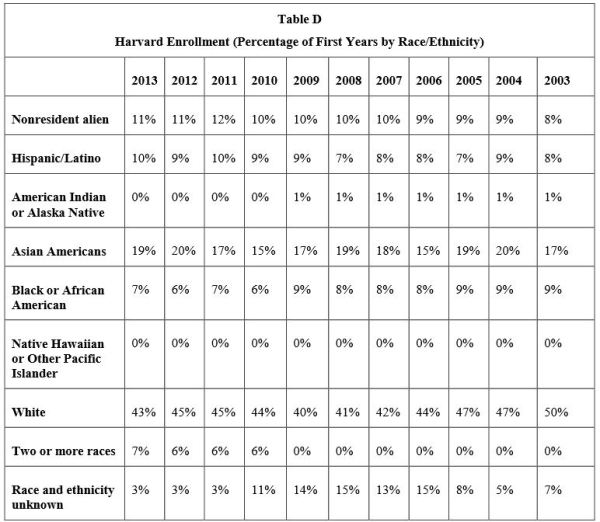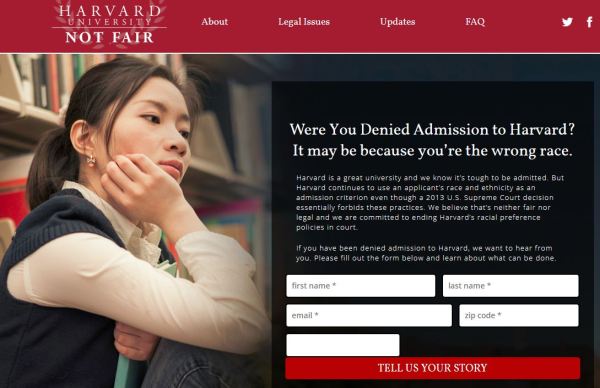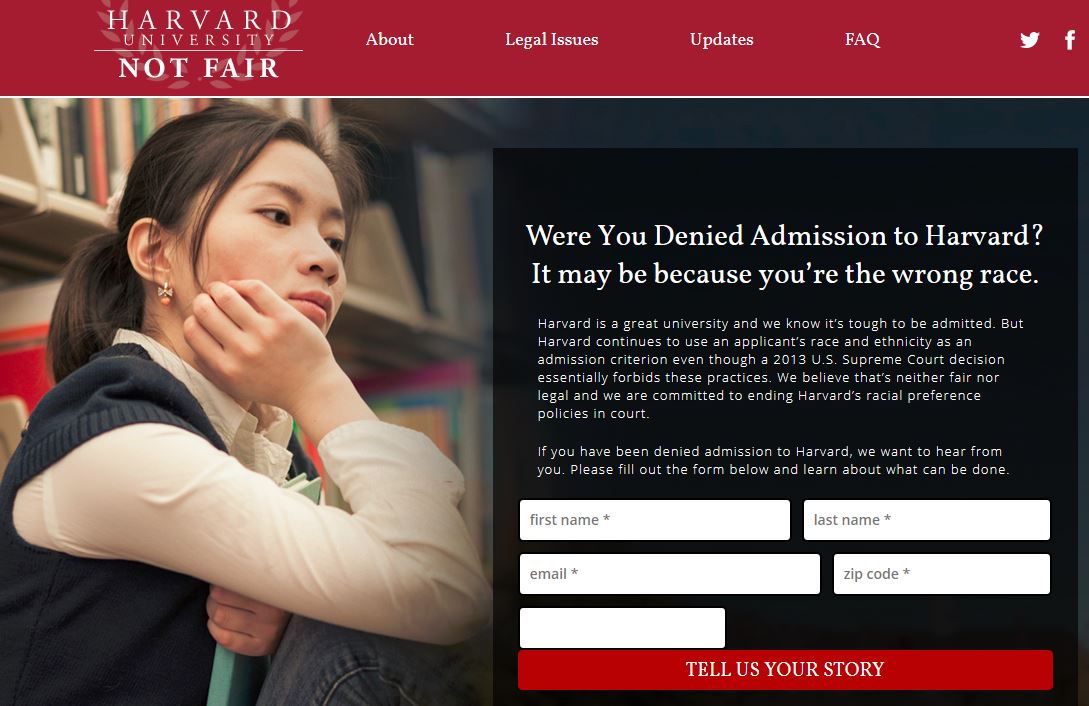 Harvard and the University of North Carolina Chapel Hill have been sued for their admissions practices by the organization Project for Fair Representation. The suit says that Harvard and UNC Chapel Hill are making admissions harder for Asian Americans than those of other races, citing enrollment figures like these show that despite growing numbers of Asian Americans applicants in the population, the percentage of races has remain rather steady. These lawsuits generate many questions in my mind. Who is behind these lawsuits? How big a problem is discrimination against Asian Americans at places like Harvard? Is this a key problem that Asian Americans should focus on?
Harvard and the University of North Carolina Chapel Hill have been sued for their admissions practices by the organization Project for Fair Representation. The suit says that Harvard and UNC Chapel Hill are making admissions harder for Asian Americans than those of other races, citing enrollment figures like these show that despite growing numbers of Asian Americans applicants in the population, the percentage of races has remain rather steady. These lawsuits generate many questions in my mind. Who is behind these lawsuits? How big a problem is discrimination against Asian Americans at places like Harvard? Is this a key problem that Asian Americans should focus on?
The Organization Behind the Lawsuit
 The Project for Fair Representation is an organization backed by Edward Blum. Blum also was the driving force behind Fisher vs the University of Texas along with other actions (including negating parts of the Voting Rights Act) against what he sees are racial preferences. The plaintiff in the case is Students for Fair Admissions, and organization for which Blum has been recruiting with sites like this, which often feature Asian Americans in their pictures.
The Project for Fair Representation is an organization backed by Edward Blum. Blum also was the driving force behind Fisher vs the University of Texas along with other actions (including negating parts of the Voting Rights Act) against what he sees are racial preferences. The plaintiff in the case is Students for Fair Admissions, and organization for which Blum has been recruiting with sites like this, which often feature Asian Americans in their pictures.
Asian Americans and Elite College Admissions
This is a subject that we have discussed many times. The Harvard lawsuit says that holistic admissions are a key part of the problem. Anecdotes from a former Ivy Admissions officer and this volunteer who worked for Berkeley admissions would seem to indicate some bias. Holistic admissions also has its roots in techniques used by the Ivy League to reduce the number of Jews being admitted, along with other techniques like legacy admissions. The enrollment numbers above would seem to indicate relatively stable percentages of Asian Americans, as the lawsuit says.
So is Harvard definitely discriminating? As I mentioned in this post, it’s hard to definitively say. Some argue that Asian Americans aren’t in groups that the university wants to have, like athletes. Indeed, Harvard has been diligently building up their football program, a college sport that is not full of Asian Americans. While holistic review has been cited to hurt Asian Americans, Jeff Yang mentions how it helped him and his sister get into Harvard. Holistic review helped me get into an Ivy, as my academics ended up looking much better when considering the low quality of my high school. As an alumni admissions interviewer, I have also seen holistic review help an Asian American who had difficult, impoverished circumstances – exactly the kind of person that many say are hurt by holistic admissions.
Legacy admissions (Affirmative Action for the children of alumni) is a much more troubling issue. It’s hard to deny that the accident of birth is a poor admissions criteria, and it seems totally unrelated to merit. Of all American universities, Harvard’s endowment doesn’t need the extra money that legacy admissions are said to bring in. I thought it rather shocking that UNC, a public university, still provides a legacy advantage. I have heard a well known Asian American activist snarkily say that Asian American alumni of Ivies never complain about admissions because they don’t want to risk reducing the chances of their own children getting in. My personal experience with my classmates (I went to an Ivy) is that the number of Asian American legacy admits is increasing from what seemed like zero when I was in school. Harvard’s legacy admit rate is said to be around 30%, much higher than the population at large, but not a sure definitely. Are legacies that much better? Are they drastically worse academically? I don’t think that anyone outside of admissions committees knows for sure.
Ivy League universities in particular could resolve these questions by providing enough data for people to analyze themselves. My anecdotal experiences and Jeff Yang’s could just be outliers or representative – there is just no way to know in a systematic manner. Thomas Espenade’s work on admissions has been cited by some as evidence of anti-Asian discrimination, but criticized by others for being fairly old. In any case, there is just no way to get more data. Some say that this lawsuit should spur more transparency in admissions. I would agree.
More Pressing College Problems for Asian Americans and Others?
While many Asian Americans have lined up against these suits and others support them, the concern that I and others have about these kind of lawsuits are that they are not the biggest concerns that Asian Americans should have about the American college system. Support for public colleges has been steadily declining, and this affects many more Asian Americans than those who make it to the Ivy League or other a few other prestigious schools. For example, at San Jose State, every single major for freshmen is impacted (not everyone will get the classes they want). Harvard enrolls around 1600 freshman, and that is not much more than the total number of Asian American freshman at San Jose State. You might argue that it doesn’t matter since San Jose State is no Harvard, but San Jose State supplies more engineers to Apple Computer than Stanford, MIT, or any other college.
A key line to look at Harvard enrollment table is that the top one – of nonresident aliens. Many public and private universities have been seeking out of state students, both American and non-American, who can pay full priced tuition, in order to balance their budgets. It doesn’t seem wise to argue over who gets shrinking amounts of slots rather than focusing on increasing the total number of available to Americans.
Finally, not all Asian American and Pacific Islander groups are making it into college at above average rates. Cambodians and Vietnamese have bachelor degree rates 5% and 15% respectively, which is lower than the general population rate and much lower than many other Asian Ethnic Groups. Before Proposition 187 passed, Filipinos were covered under the University of California’s affirmative action plans. It’s worth spending some energy on these groups that probably would benefit little if it at all from these lawsuits.
(Image captures from Project for Fair Representation)








